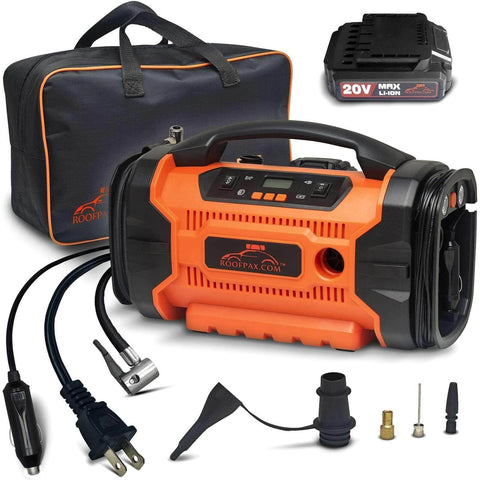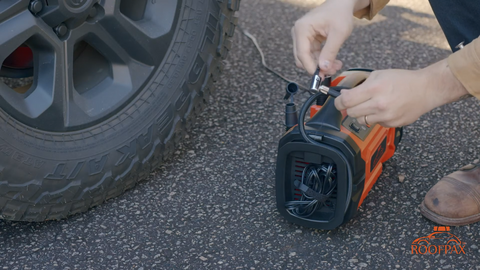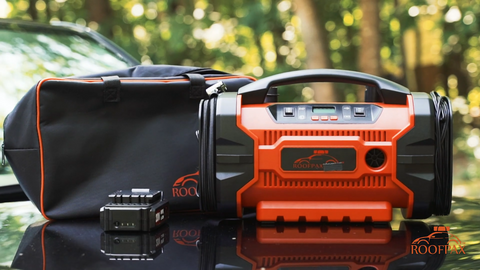Advantages of Maintaining Proper Air Pressure for Car Tires When Carrying a Heavy Load

In the fast-moving world of automotive technology and transportation, it is crucial to prioritize the optimal performance of your vehicle. One aspect that is often ignored but can greatly affect safety and efficiency is maintaining the correct air pressure in your car tires, especially when carrying a heavy load. In this article, we explore the important benefits of keeping your tires properly inflated to improve your overall driving experience and extend the lifespan of your vehicle.
Why is Proper Tire Pressure Important?
Having the right tire pressure is very important for many reasons. It makes sure that the tire has the best possible contact with the road, which improves grip, stability, and braking power. Keeping the tire pressure at the correct level also helps to evenly distribute the weight of the vehicle across the tire tread, stopping uneven wear and making the tires last longer. Furthermore, it also helps to save on fuel costs by reducing rolling resistance and improving fuel efficiency.
Improved Safety and Stability
One of the primary benefits of maintaining the correct tire pressure when carrying a heavy load is enhanced safety and stability. Adequate air pressure ensures that the tires maintain proper contact with the road surface, reducing the risk of accidents, skidding, or loss of control. This becomes particularly crucial when your vehicle is loaded with a substantial weight, as the tires need to distribute the added pressure evenly.

Enhanced Load-Carrying Capacity
Maintaining the right tire pressure while carrying a heavy load has many advantages, with safety and stability being the most important ones. By having enough air pressure, the tires can stay in contact with the road surface effectively, minimizing the chances of accidents, skidding, or losing control. This is especially critical when your vehicle is carrying a significant weight, as the tires must evenly distribute the extra pressure.
Fuel Efficiency and Cost Savings
Having the right tire pressure is super important for fuel efficiency, especially in today's eco-friendly and budget-conscious world of cars. When your tires are underinflated, they create more resistance on the road, which means you'll need more fuel to keep moving. On the other hand, if your tires are overinflated, they won't have enough grip on the road, which can also decrease fuel efficiency. So, by making sure your tires are properly inflated, you'll find that sweet spot that improves your gas mileage and saves you money on fuel.
Prolonged Tire Lifespan
It is important to properly maintain your tires in order to extend their lifespan. Following the manufacturer's recommended tire pressure ensures that the weight is distributed evenly, preventing premature wear and tear. By doing so, you can prolong the life of your tires, decrease the need for frequent replacements, and save money in the long run.
Comfortable Ride Experience
Properly inflated tires not only ensure safety and efficiency but also contribute to a more comfortable driving experience. When carrying a heavy load, maintaining the correct tire pressure helps absorb shocks and vibrations, providing a smoother ride. This is particularly crucial for long journeys or when transporting valuable cargo, as it minimizes the impact on both the vehicle and its occupants.

Reduced Risk of Overheating
Underinflated tires generate more heat due to increased friction between the tire and the road surface. When carrying heavy loads, this heat buildup can be exacerbated, leading to overheating and potential tire failure. Proper tire pressure helps dissipate heat more effectively, reducing the risk of blowouts and other tire-related issues, particularly during extended periods of driving with heavy loads.
Tire Pressure Monitoring Systems (TPMS)
Tire Pressure Monitoring Systems (TPMS) have become a standard feature in many vehicles due to advancements in automotive technology. These systems monitor tire pressure constantly and alert the driver if there are any deviations from the recommended levels. With TPMS, drivers can monitor their tire pressure in real-time, allowing them to quickly address any issues and prevent potential problems caused by improperly inflated tires.
Should You Increase Tire Pressure for Heavy Loads?
When loading a vehicle with heavy cargo or towing a trailer, the added weight places additional stress on the tires. To compensate for this increased load, it's advisable to adjust tire pressure accordingly. Increasing tire pressure helps distribute the weight more evenly across the tire's surface, mitigating the risk of overloading and minimizing tire wear. However, it's imperative to adhere to the vehicle manufacturer's guidelines and recommendations regarding tire pressure adjustments for heavy loads. Overinflating tires beyond the specified limit can lead to reduced traction and compromised handling, posing safety hazards on the road.
Tire Inflation Tips
To maintain proper tire pressure, consider the following tips:
- Regularly check tire pressure using a reliable tire pressure gauge, especially before long trips or when carrying heavy loads.
- Inflate tires to the recommended pressure as specified by the vehicle manufacturer.
- Avoid overinflating or underinflating tires, as both can compromise safety and performance.
- Monitor tire pressure using a Tire Pressure Monitoring System (TPMS) if available in your vehicle.
- Consider investing in a quality portable air compressor like RoofPax, designed for car tires, to ensure convenient and efficient tire inflation on the go.
How Does Tire Pressure Affect Load Rating?
Proper tire pressure is essential for determining a tire's load-carrying capacity, also known as the load rating. This rating signifies the maximum weight a tire can handle when inflated correctly. If tire pressure is too low, it can decrease the tire's load-carrying capacity, which may result in overloading and tire failure. On the other hand, maintaining the right tire pressure guarantees that the tires can safely support the intended load without the risk of structural damage or blowouts. It is crucial to regularly check and adjust tire pressure based on the vehicle's load rating to ensure the safe and efficient transportation of heavy loads.
How Does Weight Affect Air Pressure?
Understanding the correlation between weight and air pressure is vital for maintaining optimal tire performance. As the vehicle's weight increases, the tires experience greater compression, resulting in a decrease in air volume and pressure. This reduction in air pressure affects the tire's contact patch with the road, potentially compromising traction and stability. By adjusting tire pressure to accommodate the added weight, drivers can optimize tire performance and enhance overall vehicle safety. Properly inflated tires ensure adequate load-bearing capacity, minimizing the risk of tire damage and ensuring a smooth and controlled driving experience.

What is the Recommended Tire Pressure for Heavy Loads?
The appropriate tire pressure for heavy loads can vary depending on factors such as the vehicle's make and model, the type of tires used, and how the weight of the cargo is distributed. Manufacturers usually offer recommendations for adjusting tire pressure based on the load, ensuring the best performance in different situations. Before setting off with a heavy load, it's important to refer to the owner's manual or consult with a professional automotive technician to determine the correct tire pressure settings. Following these guidelines can help drivers maintain stability, extend the life of their tires, and ensure safe driving habits.
All in all
Maintaining proper air pressure in your car tires when carrying a heavy load is not just a recommended practice; it's a necessity for ensuring safety, stability, and efficiency. From improved load-carrying capacity to prolonged tire lifespan and enhanced fuel efficiency, the advantages are undeniable. Embracing a proactive approach to tire maintenance not only benefits your vehicle but also contributes to a more sustainable and cost-effective driving experience.
Investing in quality tire maintenance equipment, such as the RoofPax Air Compressor, further facilitates convenient and reliable tire inflation, making it a valuable asset for every vehicle owner. Embrace the benefits of proper tire maintenance and embark on your journeys with confidence and peace of mind.
FAQs: Maintaining Proper Air Pressure for Car Tires When Carrying Heavy Loads
Why is Proper Tire Pressure Important?
Proper tire pressure ensures optimal contact between the tire and the road, enhancing traction, stability, and braking performance. It also distributes the vehicle's weight evenly, preventing uneven wear and extending tire lifespan. Moreover, it contributes to fuel efficiency by reducing rolling resistance, ultimately saving on fuel costs.
How Does Tire Pressure Affect Load Rating?
Tire pressure plays a crucial role in determining a tire's load-carrying capacity, known as the load rating. Insufficient tire pressure reduces the tire's load-carrying capacity, potentially leading to overloading and tire failure. Maintaining proper tire pressure ensures that tires can safely bear the intended load without risking structural damage or blowouts.
How Does Weight Affect Air Pressure?
As the vehicle's weight increases, tires experience greater compression, resulting in a decrease in air volume and pressure. This reduction in air pressure affects the tire's contact patch with the road, compromising traction and stability. Adjusting tire pressure to accommodate the added weight optimizes tire performance and enhances overall vehicle safety.
What is the Recommended Tire Pressure for Heavy Loads?
Consult your vehicle's manual or the placard located on the driver's side door frame for the specific recommended tire pressure under heavy-load conditions. Adhering to these guidelines ensures that your vehicle operates efficiently and safely, even when subjected to increased weight.
Should You Increase Tire Pressure for Heavy Loads?
Yes, it's advisable to adjust tire pressure when loading a vehicle with heavy cargo or towing a trailer. Increasing tire pressure helps distribute the weight more evenly across the tire's surface, mitigating the risk of overloading and minimizing tire wear. However, it's essential to adhere to the manufacturer's guidelines to avoid safety hazards on the road.




